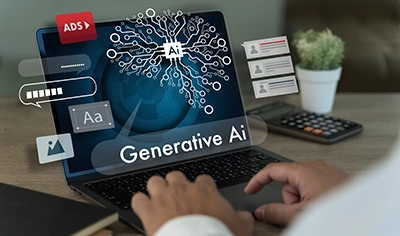Artificial Intelligence has been an instrumental force behind disruptive transformations in businesses across industries. At the heart of this transformation lies Generative AI, a groundbreaking technology that is poised to disrupt traditional business models, transform how businesses operate, and unlock unprecedented growth opportunities.
It is estimated that this emerging technology has the potential to contribute trillions of dollars to the global economy annually, primarily by automating tasks that currently consume nearly 70% of employees’ time. Furthermore, the market size of Generative AI is projected to grow from 43.87 billion USD in 2023 to 667.96 billion USD by 2030, at a CAGR of 47.5% over the forecasted period. This may be the reason why enterprises both large and small are exploring avenues to adopt and implement this disruptive technology, however, it is important to understand that besides showing tremendous potential, Gen AI also raises concerns related to security and ethical implications. Let’s delve deeper to understand the challenges faced by businesses when implementing this groundbreaking technology.
Kickstart Your Generative AI Journey Today
Generative AI Revolution: Navigating Challenges and Strategic Solutions
Implementing Generative AI can be transformative in the fast-changing business landscape but it comes with a set of challenges that must be addressed for successful implementation and to leverage its full potential. Here are the challenges, along with the corresponding solutions, that businesses need to consider when implementing this disruptive technology:
1. Data Privacy and Security
One of the key challenges that businesses may face when embracing this transformative technology is data privacy and security. Gen AI models rely heavily on large volumes of datasets to produce meaningful and accurate results, however handling sensitive or proprietary data can pose security and privacy concerns. To overcome this critical issue, businesses need to make sure that they strictly adhere to ethical guidelines and ensure compliance with data protection laws to safeguard sensitive data from potential breaches. In addition, robust data governance policies and practices, including strong encryption methods and data anonymization techniques, are crucial to prevent data breaches and maintain compliance. For instance, if a healthcare institution wants to employ Gen AI models to predict patient outcomes based on medical records, it must anonymize data to maintain data confidentiality whilst ensuring compliance with regulations like HIPAA.
2. Ethical and Bias Considerations
Gen AI models learn from the input data and if the training data that is fed into the system is biased, the output generated by the AI models will also be biased. This may lead to discriminatory or unfair results that may damage a brand’s reputation. In other words, businesses where transparency is critical, biased outcomes can be a major barrier to AI adoption. Therefore, it makes sense to address these ethical concerns to ensure inclusivity and fairness in generated outcomes.
To tackle the challenge, businesses must use unbiased datasets when training AI models and regularly test and monitor the generated outputs to determine any sign of bias or discrimination. Incorporating ethical and bias considerations into the implementation strategy is critical for responsible AI deployment. For instance, if an insurance company wants to employ Gen AI models that can help them automatically assess damages and calculate claims, they must train the AI models with distinct datasets so that the generated output is unbiased and provides a coherent explanation of its decision-making process.
3. Integration With Existing Systems
Integrating this disruptive technology with existing workflows and business processes can be a challenging task since it requires changes in workflows and strong technical know-how to enable AI models to interact with existing systems. This may lead to resistance among the workforce. To overcome the issue, businesses need to develop a change management strategy that involves necessary training to overcome the fears or concerns that employees may have. When providing training, emphasize the value that Generative AI models can bring not only to the business but also to individual roles.
4. Computational Resources and Costs
Training Gen AI models demands substantial computational resources, including significant memory and high-performance GPUs. Small and mid-sized businesses may face challenges in training and deploying AI models due to limited access to high-performance computing resources. For instance, an online startup looking to deploy AI models for offering personalized product recommendations to their customers may not have enough computational power and the right infrastructure required to train AI models, which in turn, limits their ability to offer personalized recommendations. To overcome the issue, SMBs can consider utilizing managed AI services that not only eliminate the need for managing the infrastructure and model training but also allow businesses to leverage AI capabilities without worrying about computational requirements. They may also consider cost optimization strategies such as setting up automated scaling based on workload demands or using spot instances for non-critical workloads to reduce costs.
Summing Up
Generative AI presents a host of opportunities for businesses, however, it comes with a set of challenges that need to be addressed to successfully embrace and unlock the potential of this disruptive technology. If you are also planning to embrace the potential of this disruptive technology, you may consider partnering with a professional AI development company that has rich prowess in Prompt Engineering, Chatbot Development, Large Language Model (LLM) Configuration, and Knowledge Base Creation.
Join us for our upcoming live webinar – Move Beyond the Hype: A Guide to Your First Generative AI Implementation and learn how our step-by-step guide can help you quickly assess your organization’s Gen AI readiness, overcome challenges, and kickstart the implementation journey.
Not just this, all our webinar attendees will get a complimentary consultation invite to discuss how Gen AI can be used in their specific business model.






